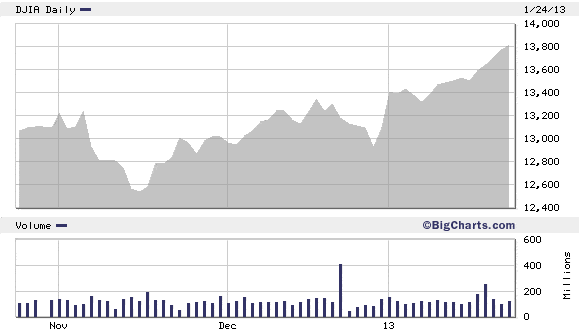Separating Company Performance From Stock Performance
I’ve learned a lot as an investor over the past few years. When I first started buying equity in companies I thought of the stock market as a pretty exciting place. You’ve got all these whiz-bang charts that reinforce the idea that the stock market is some kind of crazy casino where stocks go up and down for seemingly no reason at all. Place your bets, gentleman!
It’s the fact that stocks do go up and down for seemingly no reason that a lot of people are scared to invest in stocks. In his seminal work, The Intelligent Investor*, the great investor and teacher to Warren Buffett, Benjamin Graham, personified the stock market as “Mr. Market”. He attempted to rationalize the gyrations by explaining that the stock market was like a moody, bi-polar salesman. And every day he comes to your doorstep ready to buy and sell stocks. Sometimes he’s in a particularly pessimistic mood, and on days like this he is usually willing to let stocks go cheaply because he’s worried about all of the problems in the world. Other days, he’s feeling particularly upbeat and the stocks he’s selling are priced at a premium. These prices aren’t necessarily connected to the underlying performance of the businesses the stocks represent, and can quite often instead be related to psychological effects that are impossible to quantify.
But I don’t submit to Mr. Market’s moodiness. And you don’t have to either.
When buying or selling stocks you should always separate company performance from stock performance. When you’re analyzing the fundamental quantitative aspects of a company you’re dealing with hard numbers. It’s impossible to let psychology dictate company performance because the numbers are right there in front of you. A revenue growth rate is X. EPS has grown over the last decade by Y. You can value a company based on absolute performance quite easily in this manner.
However, problems arise for some investors when they see that Mr. Market disagrees with the valuation they slap on a company. And sometimes Mr. Market disagrees quite strongly.
This has happened to me many times. Over the last few years I’ve invested in companies based on strong fundamental performance, and then shortly thereafter Mr. Market becomes particularly cynical on these companies. It’s easy to ask what I may have done wrong. How can I possibly be right, and Mr. Market in all his genius be wrong?
Well, the market is compulsively consumed by emotion. Meanwhile, companies, for the most part, are not. Companies sell products and/or services. They manufacture things that people want and/or need. They produce and grow. And it’s in this production that company performance can quite easily be separated from stock performance. If a company’s top line and bottom line is growing at substantial rates, and investors are getting paid a larger piece of the profit pie year in and year out, yet Mr. Market doesn’t like the stock does that mean he’s right?
For instance, I purchased shares in Digital Realty Trust, Inc. (DLR) back on 6/3/13 for $59.34 per share. I analyzed the company and felt the value was there. When I analyzed the company I found that since going public in 2004, the REIT managed compound FFO growth of 18.7%, and compound dividend growth of 15.7% since 2005. Growth was slowing, but even assuming growth would be halved I still felt this was a pretty solid investment.
Well, Mr. Market didn’t agree. Due to a lot of noise regarding accounting practices and potential increased competition Mr. Market decided that shares in this REIT were worth significantly less shortly after I made my investment. Was this attitude due to actual fundamental problems with the company? No. Mr. Market was instead concerned about things that hadn’t really materialized. And as such the market cap on this stock fell by ~27% by the end of the year, bottoming out at $43.04 in late December 2013. Oh, Mr. Market, you can be a moody one!
But what can I do? Mr. Market says my stock is worth less. So it must be worth less? Maybe I should just sell and move on. I obviously made a mistake, right?
Wrong.
I bought more.
After looking at the company again on multiple occasions and not seeing anything fundamentally problematic I decided to average down on my position and buy as Mr. Market’s pessimism reached a feverish peak.
I added to my position in DLR on 8/1/13 at $54.75 per share. And then I finally completed my purchasing of shares in this REIT on 10/31/13 at $46.74 per share.
But Mr. Market was pessimistic on this stock, so it must be priced even lower now? Mr. Market is never wrong, right? Well, as of today shares in DLR are priced at $53.48.
And after all that noise Mr. Market was concerned about, what actually materialized over the last six months?
Digital Realty released third quarter results on 10/29/13 which showed a $1.10 in diluted FFO, a slight decline from the $1.13 they were able to generate in 3Q2012. This report also included a 4% reduction in FFO guidance, with a revised 2013 FFO per share outlook of $4.60-$4.62 vs. $4.73-$4.82 previously. So Mr. Market deemed a ~4% guidance revision worth a ~27% reduction in market cap. Emotional much?
DLR also recently increased its quarterly per share dividend by 6.4% just earlier this month. For a company that is in a lot of trouble things seem to be humming along pretty well. Oh wait, I forgot that company performance is completely separate from stock performance.
If I would have let Mr. Market’s pessimism affect my decision making process I would have sold DLR for a loss and also missed out on a 6.4% raise in my income coming from this position. I would have also let DLR shares go cheap, because when they bottomed out shares were going for about 10x FFO.
When buying or selling stocks it’s imperative you don’t let stock performance cloud your vision of company performance. What I might recommend you do is when you’re analyzing a company ignore the current stock price completely. I know that might be difficult to do in this age of social media and information overload. However, if you’re able to think independently and value a company regardless of what Mr. Market says it’s worth you’ll do well over the long haul.
I wrote an article a little while back expounding on how I analyze and value stocks. And it was only after reasonably valuing a company did I write about comparing your result to Mr. Market’s. This is so that you can buy below what you deem to be fair value to increase your potential margin of safety. If you value a company at $60, and Mr. Market is selling for $50 then I’d say you’re in a pretty good position assuming the qualitative aspects of the company look good.
Don’t let the market’s psychology overwhelm you. Insist on quality, pay close attention to the fundamentals, and stick to your guns. Use Mr. Market to your advantage; when his emotions get the best of him and he decides to offload stocks at discount prices look at that as an opportunity to buy what you were already interested in at even cheaper prices.
Stop thinking of the stock market as a casino. Instead think of it as a store selling merchandise. Because that’s pretty much what it is. In this case, the merchandise is stocks. And just like any other store, some of this merchandise will be overpriced, while some of it will be priced at levels cheaper than intrinsic value. The key is to focus on the latter, while also focusing on the merchandise itself instead of the price. When Mr. Market decides to put high quality companies in the clearance section it’s time to sharpen your pencil and take a fresh look at the company’s prospects. If everything still looks good then you may have an opportunity before you whether Mr. Market realizes it or not.
I currently manage a portfolio with 44 different equity investments. That’s 44 companies I have to keep up with. But I don’t let stock prices tell me how these companies are doing. I let the companies themselves tell me how they’re doing by way of monitoring annual reports, earnings reports, press releases, and other investor communications. I routinely scan for dividend increases because that tells me the company has the cash necessary to pay shareholders a rising stream of cash, and management is confident about future prospects. Relying on stock prices to make buy/sell decisions would be akin to letting the tail wag the dog.
So stay true to yourself and your analysis. Don’t let Mr. Market bully you with his overwhelming emotions. Stick to quality, and focus on the quantitative fundamentals and qualitative aspects of a company. After all, a stock’s fair value is based on company performance, not stock performance.
Full Disclosure: Long DLR
How about you? Do you always attempt to separate company performance from stock performance?
Thanks for reading.
Photo Credit: Prakairoj/FreeDigitalPhotos.net
*Amazon link within article is affiliate link.








Amen brother! The stock price is rarely tied to company performance in the short term. Earnings releases are prime examples of Mr. Market’s moodiness. $0.01 beats or misses can lead to huge moves in the share price.
Great perspective that every long term investor should share. I love those emotional reactions from Mr. Market that create buying opportunities. I don’t own as many stocks as you do but I actually added to my position in DLR recently as well.
Good thought process, I did not do so much thought process, but eventually carry DLR in my portfolio!
JC,
You’ve got it. It’s amazing to me to not only see large swings on beats or misses, but also just the day to day swings. On really no news at all you see these large cap companies swing by 1% or so. It’s just funny to witness this and then listen to the MPT fans talk about how the market is fairly valued at all times.
Thanks for stopping by!
Best wishes.
Zach,
Buying opportunities, indeed! 🙂
Great job adding to DLR on weakness. This article could be timely for better or worse as DLR releases its fourth quarter and full-year report tomorrow. We’ll see how close they were to guidance.
Cheers!
dividendmom,
Haha. I’m too analytical for my own good sometimes. 🙂
I hope DLR continues to serve us well for many years to come!
Take care.
I have to agree. This earnings season has been particularly nice for me. PEP, KO and WMT all down due to short term concerns.
It took a while, but I am glad that I can finally focus farther down the road.
It’s a good edge to have.
Take care
Ultimately, the most important part about this is the removal of emotions. We as people are naturally emotional beings and the gyrations of Mr. Market plays right into this, but not in a good way. DLR, and REITs by and large, were a prime example of how investing can toy with the emotions this last year. I think of a stable REIT like Realty Income that got hammered, but is as steady as they come with little change in the fundamentals.
ILG,
Once you have that edge you never want to let go. I promise you that! 🙂
Great holdings there. Glad to have you as a fellow shareholder.
Thanks for stopping by!
Best regards.
W2R,
Absolutely. It’s all about separating emotions from real numbers. It’s easy to get wrapped up in the noise and rumors.
But that’s why I love dividend growth investing. It’s a lot easier to ignore the noise when you’re getting regular cash payments. Cash has this smoothing effect, that’s for sure! 🙂
Cheers.
Stock price and performance don’t always correlate, some stocks miss but not as bad and goes up. Others beat but not by enough and the stock gets hammered. Mr. Market is that high maintenance girl you gotta keep soothing.
Great article, but my from my point of view it is a bad idea to use intext advertise. Over the years i had seen several sites with good content and then more and more bla bla bla buy this and this and this :D. Hope your site is not going that way :). Oh and by the way check out GSK maybe thats a stock for you :).
keep up the great work
best regards from Europe
Michael
Really good advice, but it’s not always easy to actually do this! I sometime have trouble keeping actual company performance separate from stock performance in my mind – like you said, it’s helpful to base decisions on hard numbers and actual analysis rather than on past stock performance. That seems to make all the difference. If the value is there, the market will eventually find it.
Dividend Mantra,
Great article. It reminds me of the Warren Buffett quote ” Price is what you pay, value is what you get”
Best Regards,
DGI
DM, do you think there is some limit to the number of companies you’d want to analyze and keep track of? 44 seems like a lot of work, but perhaps necessary, to achieve good diversification.
Another great article. I’m personally not a fan of DLR or ARCP. I have run 2 data centers so I have a unique perspective. I only feel comfortable with O in the REIT space. VNQ for the win in IMO!
Hi DM,
I have the book “The Intelligent Investor” since 4 or 5 years!
Every summer, I sit on my terrace, smoke a cigar and read this book – again and again!
That is one of the books, you can read every year – and it´s great stuff!
I love this (very old) book.
Best regards
D-S
DGI,
Thanks for stopping by!
I’ll take the comparison to Buffett any time I can get it. BTW, Bryan @ Income Surfer emailed me about the excerpt from his upcoming shareholder letter online. As always, it’s insightful:
http://finance.fortune.cnn.com/2014/02/24/warren-buffett-berkshire-letter/?iid=HP_LN
Anxiously awaiting the full letter. 🙂
Cheers!
Charles,
Mr. Market is extremely moody. Sometimes people aren’t careful, and allow that moodiness to invade their life. By focusing on company performance alone you can completely avoid it.
Take care!
Michael,
I don’t have any advertisements within the text?
The only thing that could be construed as such would be the link to purchase The Intelligent Investor on Amazon. That’s an affiliate link, so I would get a small commission if you bought something using that link…but other than that there are no advertisements within the text. I’m not real sure what you mean?
I do have advertisements that precede the article title, and then follow the article at the bottom. These are placed there so that I can continue bringing great content at no charge. These advertisements pay for the costs of running this blog.
Thanks for the support. I appreciate it. And I appreciate you stopping by from Europe! 🙂
Best regards.
Matt,
I agree. It’s tough to separate stock performance from company performance. If it were easy we’d all be genius investors, right?
We can’t always abide by this advice, but I think if you generally do your best to avoid the psychological warfare that takes place in the stock market you’ll be much better off.
Best wishes.
DB40,
Great question there.
To me, keeping tabs on these companies isn’t work at all. It’s a lot of fun. I genuinely enjoy reading annual reports and financial statements. So seeing how these companies are going to execute key strategies over the next 3-5 years is really interesting to me. And receiving 44 dividend increases throughout the year isn’t too bad. 🙂
However, I’m probably going to max out around 50. Much more than that and it becomes too time consuming, even for me.
Although, I’d argue that, for the most part, it’s not too difficult keeping track of a portfolio like mine when most of it is comprised of major blue-chip companies like JNJ, PM, PEP, KO, and the like. Now, if it were 44 small cap biotech companies I’d probably have to quit my job to keep track of everything.
Best wishes!
Monty,
Thanks for the insight there. We’ll see how it works out for DLR. I have my concerns, but considering the yield and growth profile I’m willing to put a few chips on DLR here.
O is another great holding. I hope to increase my position at some point in the year, depending on valuation.
Take care!
D-S,
Couldn’t agree more. It’s a wonderful book, and truly the best investment book I’ve ever read. It’s simply timeless.
Thanks for stopping by!
Cheers.
Mantra, I like the approach.
If you have done your due diligence, and made the best decision possible, then in the end you can tune out the noise. As they say when you go bottom feeding, you can’t always hit the exact bottom. 😉
Cheers
Avrom
That’s one of the strongest aspects of DG investing, the ability to tune out market noise.
KMP is experience a similar level of hatred in the markets right now, doesn’t look like it’ll catch a break soon. I will add to my position soon enough!
Avrom,
I’d like to consider myself one of the most eager bottom feeders around! 🙂
Thanks for stopping by. And I couldn’t agree more; it’s tough to catch the bottoms on stocks that are falling, even when the fundamentals are solid. But, in the end, hitting the bottom doesn’t really matter as long as the valuation makes sense and you’re reinvesting the dividend income all the way along.
Best wishes.
Spoonman,
Kinder Morgan has been hammered lately. I suppose the Barron’s article didn’t help, which is a shame because it was heavily biased toward what Kevin Kaiser believes. But I keep asking who the hell is Kevin Kaiser?
Kinder Morgan released a nice rebuttal today which basically restates their position about proper CapEx reporting, and discusses their great safety record.
Take care!
Well done on a timely article for me. After your additional purchase of Coke I thought I would review my spreadsheet. Low and behold I noticed the price was only 10% higher on my original purchase price of two years ago, yet the companies fundamentals are more favourable now. Coupled with an increase in the value of Sterling over the Dollar, this was an opportunity not to miss.
Reading the above article, is an exact description of my thought processes at the time and its nice to read of someone else doing the same.
louisgunn,
Glad you found some value in the article. 🙂
Good to see you decided to also add to your position in KO. I think we should both be pretty happy shareholders over the long haul. How could you not want to own a piece of the world’s largest beverage company?
Thanks for stopping by!
Best wishes.
I’ve been reminding myself of this lately — I bought shares in a company that’s expertly managed (no debt at all!) and has been growing year over year. The stock was way undervalued by my calculation (using Benjamin Graham’s methods!) so I bought… and it dropped 15%. It’s so baffling. It’s recovering a bit now (everything was ugly in January) but still I can’t figure out why the market hates such a good company.
MAG,
Ouch! Sorry to hear about that. Never fun, and I’ve been in similar circumstances myself. TGT was my most recent.
But you know what I do when this happens?
I take a fresh look, and if everything looks the same I buy more. If Mr. Market is feeling particularly giving by allowing me to buy stocks from him on the cheap then I’m willing to take advantage of that. 🙂
Good luck!
Take care.
Sir…
Nice article and I agree with you that the fundamentals of a company determine if the company’s stock is worthy of accumulating. I also realize that digging too deep into the fundamentals can overcomplicate the process, at least for me, for finding investment quality companies. Therefore I concentrate on a company’s increasing revenues, earnings and dividends. I also note payout ratios, P/E ratios, and debt/equity ratios but to a lesser extent. I think that where we may differ is in our timeliness. I have learned over the years that although fundamental analysis will dictate which companies I should be investing in, technical analysis dictates the timing.
It’s very frustrating to buy a stock only to see it go down. This usually happens when the right stock was bought at the wrong time. An investor can blame that on the fickleness or moodiness of the markets but technical analysis can often warn the investor that the stock is about to retreat. I think this is similar to buying any product in any store. You spend a lot of time researching product specs (fundamentals) and then you look for the best price (technicals). No one should ever buy anything if you know that it’s going on sale next week. Technical analysis can give the investor insight into upcoming “sales” or tell him that the stock is (temporarily) overpriced.
I have used these two analytical methods for most of my investing life and they have served me well. I also think that by using both fundamental and technical analysis I actually am separating company performance from stock performance to the benefit of both stock selection and stock timing. My question to you is, “Have you ever tried to use technical analysis to assist you in the timing of your buys?”
Best wishes,
Dennis McCain
dennismccain.weebly.com
Dennis,
Thanks for stopping by and sharing that.
I’ve never used technical analysis at all. I don’t really believe in it. When I first started my investment research I spent some time looking into whether this works or not, which is effectively market timing. And after reading some studies that show that there is really no correlation at all from one day to another over long periods of time I actively started engaging in my current approach – which is to analyze the quantitative fundamentals and qualitative aspects of a company, and then valuing it based on a discount model. If a company looks great in analysis and is trading below what I deem fair value to be then I’m interested in purchasing. The farther below fair value it is, which would imply a margin of safety, the more likely I am to purchase. Getting caught up in the trends of the market and the noise is just something I’ve totally ignored since the beginning, and will continue to do so for my entire investment career. That was a decision I made early on and I’ve stuck to it. So far, it’s served me well.
But I wish you luck in your technical analysis. If there is value in it for you and you’ve done well then I see no reason you would want to change.
Cheers!